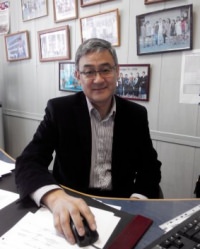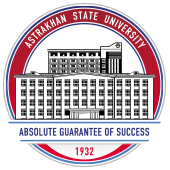Faculty of Agribusiness, Technologies, & Veterinary Medicine
Faculty of Agribusiness, Technologies, & Veterinary Medicine
 Arykbaev, Ravil Karimovich
Arykbaev, Ravil Karimovich
D.Sc. in Economics, Full Professor – Dean
E-mail: agrobusines_vm@mail.ru
Can your students study a foreign language by starting with the elementary level?
Yes, they can. If a first-year-student studied English at school, they may choose French or German to study at our University. We have qualified teachers of foreign languages; they will help you get a good knowledge of a foreign language. Besides, we run special courses of German and English.
What practical training is available at your Faculty? Is it possible to cover it outside Astrakhan Region?
Our students may join our R & D activities already at the beginning of their studies and master their future professions both theoretically and in practice, by working at a particular enterprise. They may cover their practical training at Astrakhan Region’s key agricultural enterprises. Besides, our University is the only one in Astrakhan to send its students to cover an agricultural practical training program outside Russia. Since 2004, we have been cooperating with LOGO e.V. (Germany) and APOLLO e.V. (Germany); 6-month and 12-month practical training in this country is available for our students. During their practice in Germany, our students have to attend seminars, go on various excursions, and pass examinations. Once their training in Germany is complete, they receive a certificate. Since 2004, 35 students have already covered a training program in Germany. To help our people pass the selection stage, our Faculty runs special courses of German, which helps our students enhance their language skills.
What’s a graduating chair?
A graduating chair is a chair that is responsible for contents, for arrangement, and for the quality of training our students in a particular specialty or specialization. All the Chairs at the Agrarian Faculty are graduating Chairs: the Chair of Agronomy is in charge of training agronomists and managers in the sphere of agriculture; the Chair of Veterinary Medicine trains future veterinary surgeons; the Chair of Agricultural Engineering, Melioration, & Agricultural Ecology is responsible for training agricultural engineers and nature managers; the Chair of Zoological Engineering & Animal Morphology trains future zootechnicians and processing technologists.
Faculty staff of the four graduating chairs starts working with our students since the very beginning of their university studies: they supervise the first-year-students’ educational process; they teach them fundamentals of their future professions; they arrange their project-oriented activities and all the types of practical training programs.
During the whole period of their studies, each student interacts with their graduating chair in all the issues – not just concerning their studies, but also concerning their research, innovative, and other activities. It is a graduating chair that provides making good contacts with future employers and that contributes to its graduates’ employment.
Do your students have Physical Training classes?
Yes, all our full-time and part-time students have the discipline “Physical Training” in their curricula. This is an obligatory discipline, as ASU is a university of healthy lifestyle. PT classes are delivered both in gyms and on open sites that are equipped with all the items necessary for game sports. Besides, our students go to a number of our sports sections and clubs with pleasure. We even have our own champions (in Greco-Roman wrestling and in table tennis).
What extra specialty can a student of the Agrarian Faculty choose?
Over a half of our students choose an extra specialty. That’s very convenient and useful! That can be most different specialties: from foreign languages (English, German, French, Italian, Farsi, etc.) up to Jurisprudence and Economics.
Everything depends on your wish. For example, many future agronomists and zootechnicians choose Economics. That’s logical: a farmer needs not only to grow their harvest; they also need to get a profit by selling it. Jurisprudence is popular among our future veterinarians (especially among our male students who wish to work with customs authorities); our future vets also choose Marketing quite often (especially by girls who wish to work at veterinary pharmacies or at companies that produce forage for animals).
Are your students often employed by companies where they covered their practical training program?
Our students have many types of practical training, as all the agricultural specialists must have good practical skills. As for the first years of studies, our students cover educational training programs – these are practical classes that are delivered in a field, on a farm, in a clinic, or in a workshop under supervision of their professors. Of course, it’s too early to speak about our students’ employment. At their 3rd and 4th years, our students cover practical training at real agricultural enterprises. When we decide which of them should be trained at which enterprise, we take into consideration which type of specialists is required by this or that enterprise. It’s quite frequent that a student goes on working with an enterprise already as its employee, after completing their practical training program there. We have numerous examples of that. Besides, all our students who were purposefully sent to study by an agricultural enterprise are directed to that very enterprise to complete their practical training there.
In which university buildings are classes taught?
Students of the Agrarian Faculty study at a number of our buildings – that’s determined by the location of specialized labs and workshops. In particular, Physics and Engineering are taught at the lab facility in Building #1 (Tatischev Str.), Chemistry – in chemical labs of Building #2 (Shaumyana Sq.), and agricultural techniques – at workshops on Sofyi Perovskoy Str. (near Building #8), etc.
As for our senior students, they study mostly where their graduating chair is located: our future vets study at the Chair of Veterinary Medicine in the city center (2 Shelgunova Str.,), which has all the necessary medical instruments and tools, a surgical room, an X-ray room, an ultrasonic scanning room, and so on. Our future agricultural engineers study on Sofyi Perovskoy Str., where workshops and specialized labs to carry out their projects are available for them. Our future agronomists and managers study in Nachalo Village (Building #4), where they can use specialized educational facilities to study plant cultivation, vegetation physiology, Botany and protection of plants; there is also a high-tech automated phytotron greenhouse facility to cultivate plants 12 months a year, an experimental site, and an intensive garden with trickle irrigation. As for our future technologists and zootechnicians, they also study in Nachalo Village, which has all the necessary facilities, including an experimental dairy shop and specialized labs.
Please don’t be scared with such a wide range of our locations: on the contrary, that’s much more interesting and efficient. Besides, the timetable of classes is always made up so that classes are taught only within one university building within one day for our students to study under comfortable conditions. As for Building #4 in Nachalo Village, free university buses are available for our students to get there; the buses follow a definite schedule.


